
West Side Story is a musical conceived by Jerome Robbins with music by Leonard Bernstein, lyrics by Stephen Sondheim, and a book by Arthur Laurents.

Guys and Dolls is a musical with music and lyrics by Frank Loesser and book by Jo Swerling and Abe Burrows. It is based on "The Idyll of Miss Sarah Brown" (1933) and "Blood Pressure", which are two short stories by Damon Runyon, and also borrows characters and plot elements from other Runyon stories, such as "Pick the Winner".
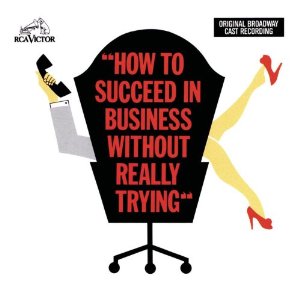
How to Succeed in Business Without Really Trying is a 1961 musical by Frank Loesser and book by Abe Burrows, Jack Weinstock, and Willie Gilbert, based on Shepherd Mead's 1952 book of the same name. The story concerns young, ambitious J. Pierrepont Finch, who, with the help of the book How to Succeed in Business Without Really Trying, rises from window washer to chairman of the board of the World Wide Wicket Company.
The New Moon is an operetta with music by Sigmund Romberg and book and lyrics by Oscar Hammerstein II, Frank Mandel, and Laurence Schwab. The show was the third in a string of Broadway hits for Romberg written in the style of Viennese operetta. Set in 1792, shortly before the French Revolution, the story centers on a young French aristocrat in disguise, who has fled his country and falls in love with the daughter of a prominent New Orleans planter.

Panama Hattie is a 1940 American musical with music and lyrics by Cole Porter and book by Herbert Fields and B. G. DeSylva. The musical is about a nightclub owner, Hattie Maloney, who lives in the Panama Canal Zone and ends up dealing with both romantic and military intrigue. The title is a play on words, referring to the popular Panama hat.

42nd Street is a 1980 stage musical with a book by Michael Stewart and Mark Bramble, lyrics by Al Dubin and Johnny Mercer and music by Harry Warren. The 1980 Broadway production won the Tony Awards for Best Musical and Best Choreography and it became a long-running hit. The show was also produced in London in 1984 and its 2001 Broadway revival won the Tony Award for Best Revival.

Silk Stockings is a musical with a book by George S. Kaufman, Leueen MacGrath, and Abe Burrows and music and lyrics by Cole Porter. The musical is loosely based on the Melchior Lengyel story Ninotchka and the 1939 film adaptation it inspired. It ran on Broadway in 1955. This was the last musical that Porter wrote for the stage.
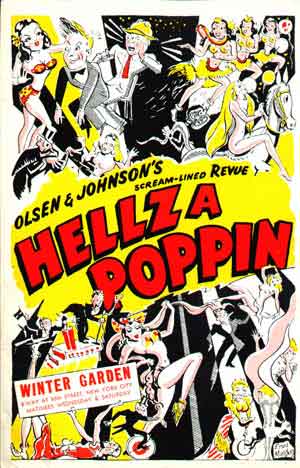
Hellzapoppin is a musical revue written by the comedy team of Olsen and Johnson, consisting of John "Ole" Olsen and Harold "Chic" Johnson, with music and lyrics by Sammy Fain and Charles Tobias. The revue was a hit, running for over three years, and was at the time the longest-running Broadway musical, with 1,404 performances, making it one of only three plays to run more than 500 performances in the 1930s.
Martin Charnin was an American lyricist, writer, and theatre director. Charnin's best-known work is as conceiver, director, and lyricist of the musical Annie.

John Emmet Raitt was an American actor and singer best known for his performances in musical theatre.

Abe Burrows was an American humorist, author, and director for radio and the stage. He won a Tony Award and was selected for two Pulitzer Prizes, only one of which was awarded.
Charles Eldridge O'Neal was an American film and television screenwriter and novelist.
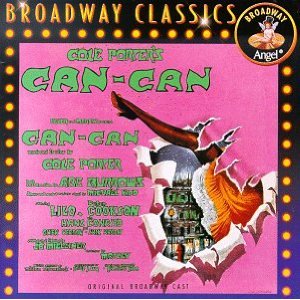
Can-Can is a musical with music and lyrics by Cole Porter, and a book by Abe Burrows. The story concerns the showgirls of the Montmartre dance halls during the 1890s.

Out of This World is a musical with music and lyrics by Cole Porter, and the book by Dwight Taylor and Reginald Lawrence. The show, an adaptation of Plautus's comedy Amphitryon, first opened on Broadway in 1950.

Robert Wesley Addy was an American actor of stage, television, and film.

Breakfast at Tiffany's is a musical with music and lyrics by Bob Merrill and a book originally by Abe Burrows but rewritten during pre-Broadway tryouts by Edward Albee. It is based on the 1958 Truman Capote novella and 1961 film of the same name about a free spirit named Holly Golightly.
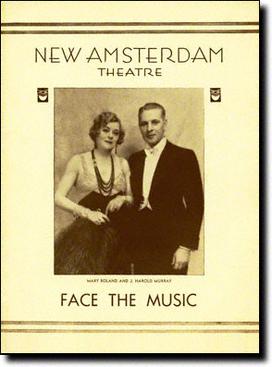
Face the Music is a musical, the first collaboration between Moss Hart (book) and Irving Berlin. Face the Music opened on Broadway in 1932, and has had several subsequent regional and New York stagings. The popular song "Let's Have Another Cup of Coffee" was introduced in the musical by J. Harold Murray.
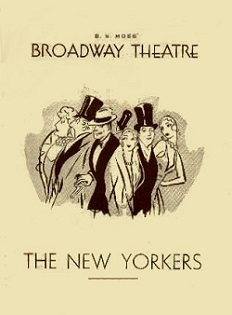
The New Yorkers is a musical written by Cole Porter and Herbert Fields (book). Star Jimmy Durante also wrote the words and music for the songs in which his character was featured.

Aladdin is a Broadway musical based on the 1992 Disney animated film of the same name with a book by Chad Beguelin, music by Alan Menken and lyrics by Howard Ashman, Tim Rice and Beguelin. It resurrects three songs written by Menken and Ashman for the film but not used, and adds four songs written by Menken and Beguelin.

Billy Budd is a play by Louis O. Coxe and Robert H. Chapman based on Herman Melville's novella of the same name. Originally titled Uniform of Flesh, the play premiered Off-Broadway in 1949. Coxe and Chapman restructured and retitled the work for its Broadway debut in 1951. The revised version was a critical success, winning the Donaldson Award for Best First Play and the Outer Critics Circle Award for Best Play in 1951. In 1952 the play was adapted for the television anthology series Schlitz Playhouse of Stars, and Peter Ustinov adapted the play into a film which premiered in 1962.

















